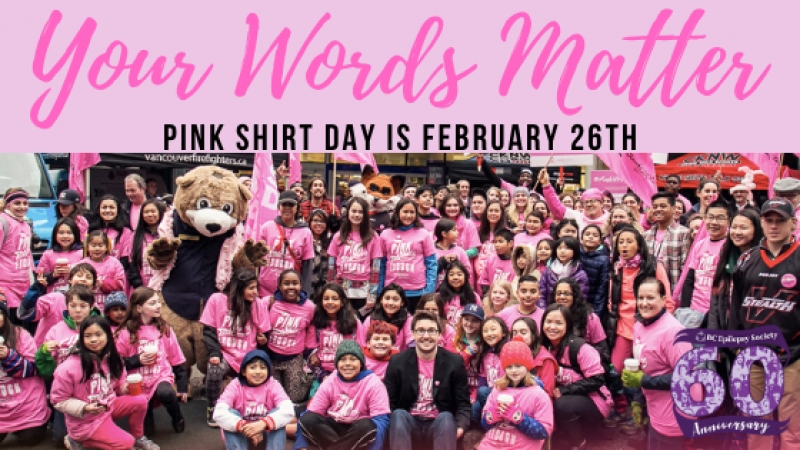Pink Shirt Day is February 26th – Your Words Matter

Today is February 26th and it is Pink Shirt Day, a day where people wear pink in support of the anti-bullying movement.
Supporting the anti-bullying movement is important because all of us, including those of us living with epilepsy, have the right to safe and supportive environments, free from the fears and harms of stigma and bullying.
However, it has been found that people living with epilepsy are at an increased risk of being bullied by others. Don’t let this get you down, because the more that people learn about epilepsy and help to educate others, the easier it will be to prevent the bullying of people living with epilepsy and reduce the stigma often associated with epilepsy.
In terms of stigma and bullying, it is important to keep in mind that your words matter. The words you choose to use regarding epilepsy can make an immense impact on people living with epilepsy, as well as on the creation of environments free of stigma and bullying. Check out the table below with information on the words you should and shouldn’t use when discussing epilepsy:
| Term(s) to Use | Term(s) to Avoid | Reasoning |
| Seizure | Fit | Saying “fit” is derogatory and insulting towards people with epilepsy |
| Tonic-Clonic Seizure | Grand Mal Seizure | “Grand Mal” meaning “big sick” is an outdated term
“Tonic-Clonic” is the updated and preferred term |
| Absence Seizure | Petit Mal Seizure | “Petit Mal” meaning “little sick” is an outdated term
“Absence” is the updated and preferred term |
| Atonic Seizure | Drop Seizure
Drop Attack |
“Drop Seizure” and “Drop Attack” are outdated terms
“Atonic” is the updated and preferred term |
| Focal Seizure
Focal |
Partial Seizure
Partial |
“Partial” is an outdated term
“Focal” is the updated and preferred term |
| Focal Aware Seizure | Simple Partial Seizure | “Simple Partial” is an outdated term
“Focal Aware” is the updated and preferred term |
| Focal Impaired Awareness Seizure | Complex Partial Seizure | “Complex Partial” is an outdated term
“Focal Impaired Awareness” is the updated and preferred term |
| Person Living with Epilepsy
Person with Epilepsy |
Epileptic | If you say “epileptic”, it is like you are saying that the person is defined by their epilepsy when this is not the case |
| Someone affected by epilepsy
He finds living with epilepsy challenging Living with epilepsy can be difficult She has epilepsy He lives with epilepsy |
She “suffers” from epilepsy
He “unfortunately” has epilepsy She was “struck” by seizures Epilepsy is awful, horrible, disgusting etc. |
Try to stay away from terms that are negative when describing epilepsy |
Remember that, in addition to being careful of the words we use, it is important to keep in mind that your words can have a profound impact not only in how other people view epilepsy but also in how people living with epilepsy view themselves and their condition. Let’s all be mindful of what words we use when discussing epilepsy so that we can reduce and prevent the stigma and bullying of people living with epilepsy because together, we can make a difference!
Sometimes, people living with epilepsy and their families may require additional support. The BC Epilepsy Society offers a variety of support groups, including In-Person and Online Peer Support for people living with epilepsy; the BCES Men’s Circle for people living with epilepsy who identify as men; the BCES Women’s Circle for people living with epilepsy who identify as women; the BCES Young Adult Circle for young adults living with epilepsy aged 18-24; Epilepsy Friends Forever (EFF) for children and youth living with epilepsy; and the BC Epilepsy Parents Network (BCEPN) for parents of children living with epilepsy. Find out more about our support groups here.
This Pink Shirt Day, we hope that you will talk about the impact of stigma and bullying on epilepsy and will choose to wear pink. Find out more about Pink Shirt Day here.





